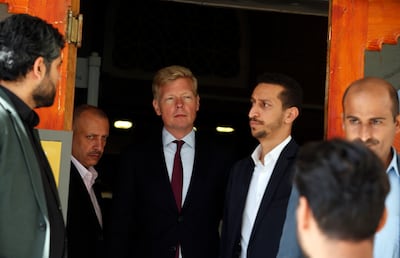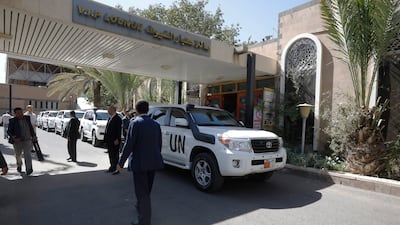Iran is sending a "steady flow of weapons" to Houthi rebels in Yemen, the US told the United Nations on Monday.
US deputy ambassador to the UN, Richard Mills, told the Security Council that such lethal external interference could only "fuel war and suffering" in Yemen, amid calls for the Iran-backed Houthis to negotiate an end to the conflict.
"Just 10 days ago, the United States intercepted a dhow carrying thousands of AK-47s from Iran to the Houthis, the third interdiction in recent months," he said.
The UAE's deputy ambassador to the UN, Mohamed Abushahab, meanwhile expressed "deep concern" over continued breaches of the arms embargo and urged the Security Council to adopt measures to enforce it.
"We have recently seen a number of seized shipments in transit to the Houthis that contain weapons, ammunition and explosive materials," Mr Abushahab said.
"These shipments have also included components of missiles and drones that can be used in launching cross-border attacks."
He warned that any aggression by the Houthis against neighbouring countries would be met with a "firm response by the Arab coalition".
The meeting came as UN special envoy for Yemen, Hans Grundberg, arrived in the capital Sanaa on Monday to push the Houthi militia for a truce renewal.
Appearing via video link, he told the council he had held "positive and constructive" discussions with the leadership in Sanaa, represented by Mahdi Al Mashat.

Mr Grundberg said he remained "hopeful" that he could build on discussions to ensure that the year ahead delivers a "more peaceful and prosperous" future for Yemenis and indicated the overall military situation in Yemen has remained "stable".
"There has been no major escalation, nor changes in the disposition of front lines," he said. "I would like to acknowledge the parties for continuing to show general military restraint."
However, the UN envoy added that “limited military activity” persists along front lines, sometimes resulting in civilian casualties. Areas of conflict include Marib, Taiz, Dali, Hodeidah, and Lahj governorates, as well as along the Saudi-Yemeni border area.
He warned that military activity, combined with negative rhetoric and escalatory political and economic measures, could create a situation where a "simple miscalculation could reignite a cycle of violence that will be difficult to reverse".
The UN chief for humanitarian affairs, Martin Griffiths, underscored the severity of the current situation.
He fears this will be another extremely difficult year for Yemenis, as humanitarian needs remain "alarmingly high" and the country’s economy continues to weaken, with basic services left hanging by an "ever-thinning thread".
He stressed that continuing problems were affecting aid delivery, as agencies were forced to contend with an increasingly challenging operating environment and funding landscape.
An estimated 21.6 million people across Yemen will this year need humanitarian assistance and protection services.
The Houthis this month repeated their demand that a dispute with Yemen's internationally recognised government over civil servants' wages must be resolved before they can agree to a permanent ceasefire.
More than three months have passed since the truce agreement between the Yemeni government and the Houthi rebel group expired in October.
Yemen's devastating civil war began in 2014, when the Houthis seized Sanaa and much of the north of the country. A Saudi-led coalition intervened at the request of the government.


